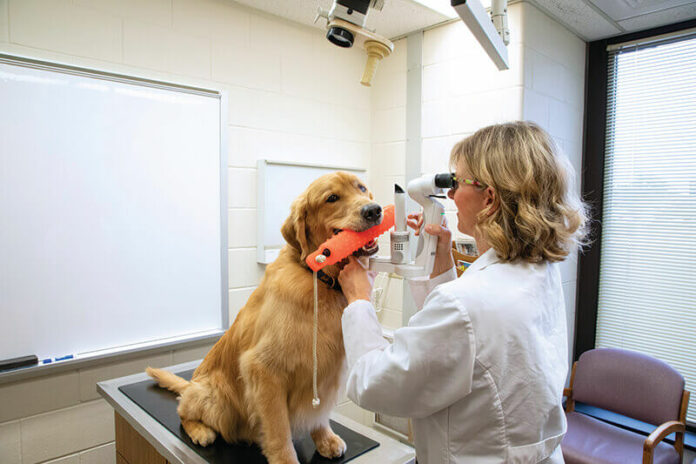A gene variant in the breed has a significant association with cancer occurrences
By KATIE HELLMAN — science@theaggie.org
Golden retrievers are known for being playful, affectionate and gentle, making them one of the most popular dog breeds around the world. Unfortunately, these beloved pets are also known for one more key characteristic: they are diagnosed with cancer at alarming rates.
Golden retrievers have a typical lifespan of 10-12 years, and around 65 percent of them die from a form of cancer. The most common cancers that affect golden retrievers are lymphoma, hemangiosarcoma, osteosarcoma and mast cell tumors; they compromise around 80 percent of all cancer deaths in this breed.
A new study from UC Davis has identified a variant in the 5’UTR (a region of messenger RNA) of the ERBBR genes in goldens, which is correlated with lifespan and plays a role in the risk of developing cancer.
“The association to ERBB4 was certainly intriguing since golden retrievers are predisposed to cancer and ERBB4 is a member of the EGFR family of oncogenes,” the study reads. “ERBB4 is also the only member of the EGFR family that can function as either an oncogene or a tumor suppressor gene.”
The study consisted of over 300 golden retriever participants. DNA was collected from the blood of golden retrievers who had died young and from goldens who were alive at the age of 14. The findings revealed that the goldens with the aforementioned gene variants lived for an average of 1.9 years longer, which is about a 15-20 percent increase in lifespan.
Additionally, female goldens lived for a noticeably longer time than their male counterparts, even when both groups had the gene variant. This is likely due to the interaction of hormones like estrogen, which play a greater role in the development of females than males.
Certain variants in this gene are linked to a two-year increase in lifespan. ERBB4 is in the same gene family as HER2, a gene associated with rapid cancer growth, and is specifically correlated with human epidermal growth factor receptors. Additionally, the gene belongs to a protein family that is prevalent in human cancers as well, meaning that this new research can have implications in both the veterinary and medical fields.
Danika Bannasch of the UC Davis School of Veterinary Medicine co-authored the study and commented on its significance in an interview with UC Davis Health.
“There are going to be many genes involved, but the fact that the gene associated with longevity is also a gene involved in cancer was really interesting to us,” Bannasch said.
The co-corresponding author of the study, Robert Rebhun of the School of Veterinary Medicine, commented on the potential impacts of these findings on human cancer research.
“If we can confirm that this variant plays a role in longevity or in the onset or progression of cancer in golden retrievers, future mechanistic studies will be aimed at determining how this variant is altering genetic or environmental risks of cancer,” Rebhun said. “Because this family of genes is known to be dysregulated in human cancer, these studies may also be important in the development and progression of some human cancers.”
Written by: Katie Hellman — science@theaggie.org









